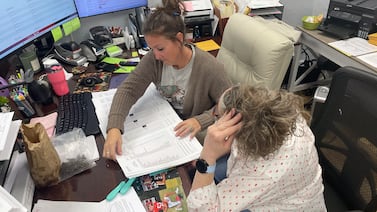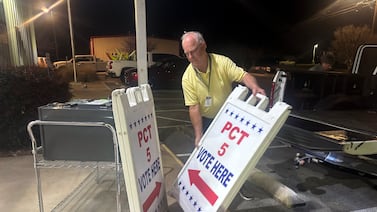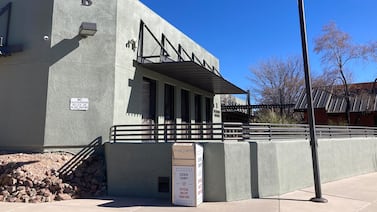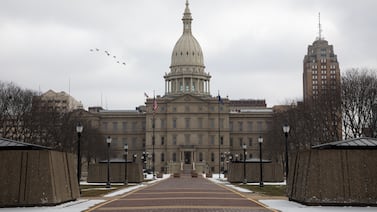Votebeat is a nonprofit news organization reporting on voting access and election administration across the U.S. Sign up for Votebeat Texas’ free newsletter here.
Texas lawmakers held their first hearing in a decade on legislation that would allow people to register to vote online, a step that would revamp the current paper-based system, reduce costs, and bring Texas in line with most other states.
But the legislation missed key deadlines and has no clear path to passage this session. At least five similar bills filed this session by Democratic lawmakers did not get committee hearings.
The one that got a hearing Thursday is championed by state Rep. John Bucy, an Austin Democrat. House Bill 311 would direct the Texas Secretary of State’s Office to work with the Texas Department of Public Safety and the state’s Department of Information Resources to implement online voter registration.
Bucy acknowledged the bill’s slim chances, but told Votebeat that the hearing was a significant step toward implementing online voter registration in Texas.
“I’ve met with my colleagues over the years. I’ve met with the Secretary of State’s Office to learn the logistics of it,” Bucy said. “It seems like the appetite for it is growing.”
He has filed the legislation every year since he took office in 2019.
“I want people to have a fresh lens at looking at online voter registration,” he said. “Forty states have done it. They’ve done it because it’s efficient, because it’s safe and it’s accurate, and that’s what we should be doing here in Texas.”
Texas, which has more than 18 million registered voters, is one of only eight states without online voter registration.
Most people in the state have to fill out a paper form, whether they are registering through an election office or while getting a new driver’s license or state ID at the Texas Department of Public Safety. Only people who already have a Texas driver’s license and are engaging in an online transaction with DPS, such as renewing their license or updating their address, can use a DPS online portal to register to vote.
A Votebeat investigation last year found that Texas’ paper-based voter registration system has for years led to data-entry errors, delays, and in some cases, the disenfranchisement of voters. Manually entering the information of hundreds and thousands of voters ahead of an election also requires some counties to hire additional staff who must work long hours at taxpayer expense.
Bucy pointed out that if legislation to require proof-of-citizenship in Texas become law, it could create additional backlogs in the paper-based system.
The Texas legislation is modeled after a longstanding state law in Arizona that requires proof of citizenship to vote in state and local elections. During a panel hosted by Votebeat Wednesday, Arizona Secretary of State Adrian Fontes said online voter registration is “really important” to administering the requirement, especially when the system relies on state identification or drivers’ license data from other agencies.
In Arizona, election officials estimate that it costs 83 cents per registrant in staff time to enter data from a paper form; the staffing cost is only 3 cents when voters use the electronic voter registration application, according to Secure Democracy USA, a nonpartisan organization that advocates on election policy. That amount does not include the cost savings from less paper and postage.
At the hearing Thursday, Jennifer Doinoff, the Hays County elections administrator and a member of the Texas Association of County Election Officials, told lawmakers that the group supports the measure. The association is made up of Republican and Democratic elected officials and nonpartisan elections administrators across the state.
“The bill increases the accuracy of the voter records,” because voters put in the information directly, she said.
Lawmakers raised various concerns about the process, and election officials said other states have already addressed many issues. For example, state Rep. Carrie Isaac, a Republican from Central Texas, asked Doinoff how election officials would ensure that people aren’t trying to register multiple times. Doinoff responded that those risks aren’t limited to online voter registration, and election officials already have procedures in place to verify a voter’s identity and to check for duplicates.
State Rep. Valoree Swanson, a Republican from Harris County, said her main concern is the lack of a voter’s signature on an electronic form.
Bucy said the bill would require voters to have a state ID or driver’s license in order to register electronically, and counties would use those records to check for a signature.
Natalia Contreras covers election administration and voting access for Votebeat in partnership with the Texas Tribune. She is based in Corpus Christi. Contact Natalia at ncontreras@votebeat.org





